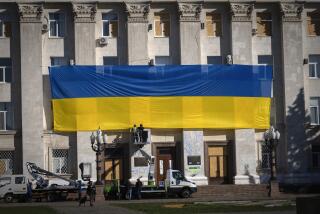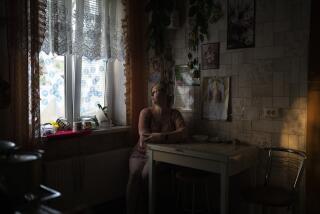Chechnya Town Manages to Steer Clear of War : Russia: Residents use diplomacy, force to keep fighters of both sides from entering unscathed haven.
- Share via
URUS-MARTAN, Russia — As Russian warplanes and helicopters pressed a bombing offensive across Chechnya, civilians were pouring this week into Urus-Martan, the only major town in the breakaway republic still unscathed by three months of war.
A recent trip through Chechnya--east, south and west of its capital city--found most towns and villages eerily empty. Only Chechen fighters, the elderly and those bent on a last, futile defense of their homes remained.
The rest were fleeing, many of them for Urus-Martan in west-central Chechnya.
Residents of Urus-Martan have used a mix of diplomacy and military force to keep Russian troops and Chechen guerrillas from crossing the town limits. Their success in holding off the war has brought their once-sleepy town new fame as a tenuous haven.
Today the town is a giant, honking snarl of crowds, cars and open-air markets. While Gudermes, Shali and other bastions of anti-Russian resistance are on the firing line, Urus-Martan is a key to whether the Chechen-Russian conflict will wane or explode.
Urus-Martan has long been a center of opposition to the rule of Chechen President Dzhokar M. Dudayev, a retired Soviet air force general who seized power in 1991.
Mutual disgust for Dudayev has allowed the leaders of Urus-Martan and the Russian military to reach agreements: The Russians don’t attack Urus-Martan, and Urus-Martan doesn’t attack the Russians.
It is an uneasy peace. Russians and Urus-Martan Chechens loathe each other. For many Russian soldiers, what began as a political war to remove Dudayev has quickly become an ethnic war against all Chechens.
Most Chechens in Urus-Martan have fled to the town from the capital, Grozny, and other places wrecked and looted by the Russians. The town’s population, normally 40,000, has swollen to 200,000.
Other towns have reached agreements with the Russians to keep the war out, only to see them broken by one side or the other.
Should the peace fail in Urus-Martan, locals say the Russians would suddenly be facing a volunteer militia of at least 30,000 heavily armed Chechens.
Since Dudayev now commands forces of fewer than 5,000, Urus-Martan’s participation would mean a new war--one that Dudayev’s hard-pressed fighters would desperately like to see.
After losing control of the presidential palace in Grozny nearly two months ago, Dudayev’s men have dispersed throughout their mountainous, Connecticut-sized republic in southern Russia.
Most are concentrated in two clusters of villages. To the west, they occupy Achkhoi-Martan and Samashki. To the east, a more entrenched group, including most of the Chechen leadership, holds the towns of Gudermes, Argun and Shali.
The Russians have been bombing both regions in recent days.
On Sunday and Monday, the streets of Gudermes were deserted except for strolling bands of Chechen guerrillas with belts of machine gun bullets draped across their chests. Russian television reported that 150 tanks were advancing on the town, and heavy fighting could be heard in the woods to the north. Chechen fighters said they fought off a reconnaissance patrol of 20 tanks.
On the front lawn of a mental hospital in Shali, patients walked about aimlessly or rocked back and forth in agitation as shelling shook the town Monday. Several cows and a man in a red bathrobe stood in the road. The man clutched his bandaged head as cars drove past.
In nearby Stary Atagi, mortar shelling was relentless Sunday and Monday.
To the west, Russians and Chechens fought furiously over Achkhoi-Martan, and Russian ground troops on Tuesday captured the road through Samashki.
A busload of refugees from Grozny hit a mine Monday near Achkhoi-Martan, killing 10 people, including a child, according to the International Organization for Migration, which organizes daily evacuations.
Wounded from all fronts are brought to Urus-Martan. This week the Urus-Martan hospital admitted 27 Dudayev fighters wounded on the Samashki and Achkhoi-Martan front. It has treated more than 1,050 wounded since the war began.
Chief doctor Ruslan Visarigov said hepatitis was working its way through the town’s population, and he predicted a cholera epidemic this summer. Urus-Martan also lacks gas, electricity and running water.
Despite all that, Urus-Martan is still much nicer than much of what is left in Chechnya, and refugees continue to pour in.
Dudayev’s men call those fleeing the war for Urus-Martan “traitors.” Urus-Martan calls Dudayev’s supporters “pseudo-patriots.”
Both sides are heavily armed, and both intend to run the country when the war is over. If the Russians pull out, leaving a wrecked and lawless landscape behind them, the result could easily be civil war.
Yet long before that happens, people in Urus-Martan expect to be dragged into war against the Russians.
All it would take, they say, is one Russian bombing attack on the town’s civilians.
“None of us have anywhere else to go,” said Ruslan Khatayev, 46, a mechanic.
Residents fear such a bombing attack could easily happen if Dudayev’s fighters get in and provoke the Russians.
Hundreds of volunteers guard Urus-Martan’s town limits, checking cars and documents. They try to keep Dudayev’s fighters from slipping in, shelling nearby Russian positions from Urus-Martan and wrecking the peace.
“It all depends on the wisdom of the Russians,” said Shirvani Altigov. “We hope they will be sensible, but we don’t believe they will be. That’s why I keep a full tank of gas in that car in the courtyard, so as to at least get my children out.”
More to Read
Sign up for Essential California
The most important California stories and recommendations in your inbox every morning.
You may occasionally receive promotional content from the Los Angeles Times.













